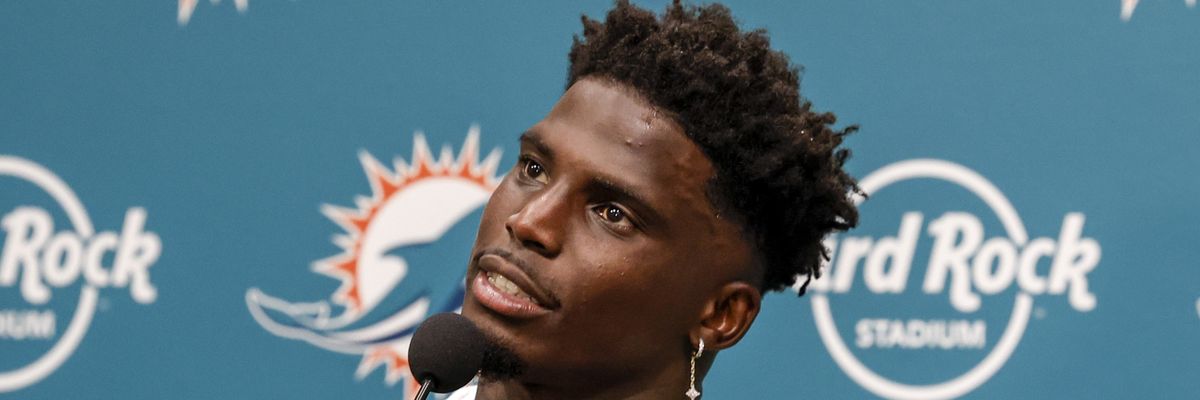In the old 1990s Nike commercials, Mars Blackmon, played by Spike Lee, asks basketball great Michael Jordan, “Is it the shoes?”
In a much more serious, disturbing incident, Tyreek Hill, star wide receiver for the Miami Dolphins, was taken down, handcuffed, kneed in the back, and manhandled by Miami-Dade police not far from the stadium where he plays.
I can guarantee you it wasn’t the shoes that got the attention of officers in a potentially deadly encounter.
It was the car, the constant criminalization of Black men, and a refusal to hold cops accountable for their actions—especially when violating Black people.
But, he added, what if he had not been a bigtime athlete? What’s the worst case scenario?
Hill, a well-paid athlete, was driving an expensive car. He’s paid his dues, sacrificed, and should be able to enjoy the fruits of his labors. He was a short distance from his Black job.
But “Driving While Black” has long been a crisis in America, and you don’t have to drive a fine car to be targeted.
“Almost every African-American or Latino can tell a story about being pulled over by the police for no apparent reason other than the color of his or her skin, especially if he or she happened to be driving in the ‘wrong place’ at the ‘wrong time’ or even driving the ‘wrong car,’” said the American Civil Liberties Union, citing cases stretching back to the 1990s.
Hill was born March 1, 1994.
“Victims of these racially motivated traffic stops rarely receive a traffic ticket or are found guilty of any violation of the law. It’s a practice called Driving While Black,” said the ACLU. “The U.S. Supreme Court established an open season on motorists in 1996 when it ruled that police could use any traffic offense as an excuse to pull a car over.” Black and White drivers engaged in illegalities “at about the same rate—28.4% in searches of Blacks and 28.8% in searches of whites.”
Yet, the ACLU noted, 41% of Black Americans say they have been stopped or detained by police because of their race and 21% of Black adults, including 30% of Black men, reported being victims of police violence.
Hill came before microphones September 8 saying he did nothing wrong and was confused about what happened and why. He calmly explained how his mother taught him to be respectful and cooperative, how he wanted to be a police officer and respected them. There are bad apples everywhere, he continued. But, he added, what if he had not been a bigtime athlete? What’s the worst case scenario?
Death.
“If Dexter Reed had not been stopped by Chicago police, he would still be with us,” Laura Washington wrote earlier this year about a controversial Chicago case.
Body cam footage of his killing, which many call an execution, captured the 26-year-old Black man sitting in his SUV. Five cops in street clothes jumped out on him in a city known for often violent, deadly carjackings.
“One demanded that Reed roll down his car window. At first, Reed complied, then rolled the window back up. Officers screamed and shouted more demands. Reed started shooting,” Washington wrote. A civilian oversight body said an officer was wounded in the wrist.
“The officers fired 96 shots in 41 seconds. Reed staggered out of the car on the driver’s side and stumbled to the ground. The officers kept shooting. Three of those shots came while Reed was lying ‘motionless on the ground,’ according to Andrea Kersten of the Civilian Office of Police Accountability,” wrote Washington.
“This tragedy leaves us with so many questions. For example, the police say he was being stopped for not wearing a seat belt. How did the officers know he wasn’t wearing the belt, since his car had tinted windows? On the video, the officers, wearing street clothes, drive hard and fast, jump out, and surround Reed’s car.”
“Did Reed shoot out of terror?” she asked in a Chicago Tribune piece.
Organizing around Reed’s death has been going on in the Windy City with many outraged and demanding justice.
“Chicago police officers reported making more than a half million stops last year on the city streets, continuing to stop Black and Brown motorists at rates disproportionate to their numbers in the driving population,” the ACLU reported in 2024. “In 2023, CPD officers stopped Black drivers at a rate 3.75 times that of white drivers and stopped Latino drivers at a rate 2.73 times that of white drivers. These disparities are similar to racial disparities reported in prior years in Chicago. CPD has never explained why it disproportionately stops Black and Latino drivers.”
There are bad apples in every system. But when institutions fail to act to correct wrongs—especially with folks having guns, handcuffs, and badges—the whole system is rotten.
